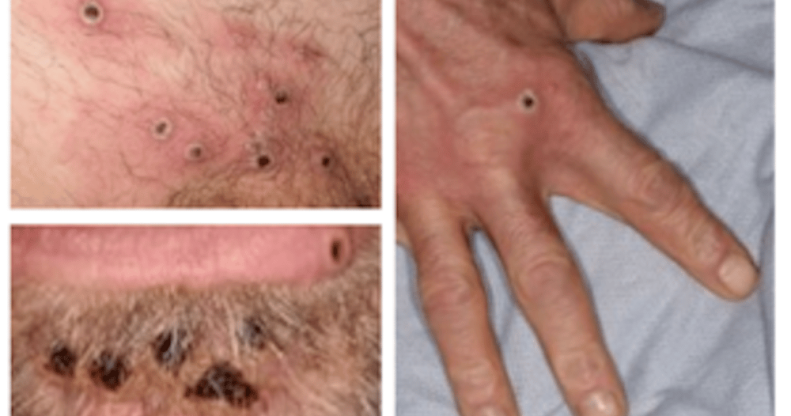Monkeypox: Young men in London make up majority of UK cases, new data reveals

Monkeypox lesions. (UKHSA)
Young men living in London are making up the majority of UK monkeypox cases, new data has revealed.
The total number of confirmed monkeypox cases in the UK has now passed 200, with 199 cases in England, five in Scotland, two in Northern Ireland and one in Wales, as of Thursday (2 June)
On Wednesday (1 June), the UK Health Security Agency (UKHSA) released more information about the populations affected by monkeypox.
Although monkeypox can affect anyone, of the 190 UK cases confirmed from 6 to 30 May, more than half (111) were among men who have sex with men. Just two of those infected were women.
In England, 86 per cent of cases were detected in London, and almost all of those infected (87 per cent) were young, from 20 to 49 years old. Travel to other European countries within the three weeks before diagnosis was only reported in 18 per cent of cases.
So far, UKHSA investigations have “identified links to gay bars, saunas and the use of dating apps in the UK and abroad”, the agency said.
It said it was working with LGBTQ+ organisations like the Terrence Higgins Trust, Stonewall and Grindr, as well as with the British Association of Sexual Health and HIV (BASHH) and the British HIV Association, to provide queer communities with public health information about monkeypox. The LGBT Consortium and Pride organisers have also been asked to share this information.
However it said the UKHSA would continued to investigate, as “currently no single factor or exposure that links the cases has been identified”.
Last month, the UK purchased 20,000 doses of the Imvanex vaccine, a smallpox vaccine that has has proved to be about 85 per cent effective in preventing monkeypox, according to the World Health Organization (WHO).
The vaccine is being offered to people who have had contact with a confirmed case of monkeypox, as well as to healthcare workers.
Dr Meera Chand, director of clinical and emerging infections at UKHSA, said: “We are working to break chains of transmission, including by contact tracing and vaccination.
“We are grateful to everyone who has come forward for testing and it is extremely important that everyone continues to be aware of the symptoms and to seek advice if they have concerns.
“We are reminding people to look out for new spots, ulcers or blisters on any part of their body. If anyone suspects they might have monkeypox, particularly if they have recently had a new sexual partner, they should limit their contact with others and contact NHS 111 or their local sexual health service as soon as possible, though please phone ahead before attending in person.”

